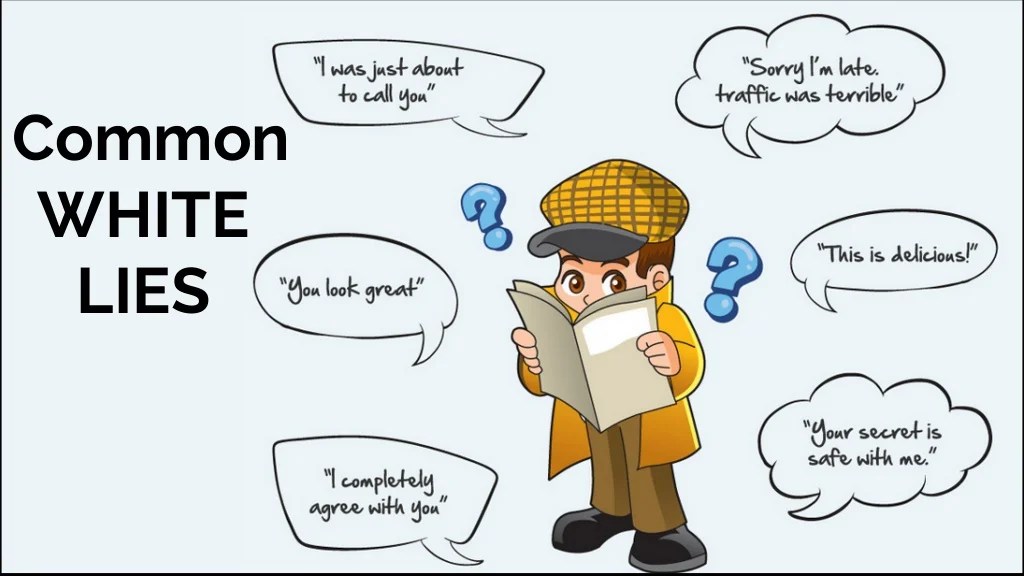Understanding White Lies: Examples And Implications
White lies are often seen as harmless pieces of deception that can serve to protect someone's feelings or maintain social harmony. These little falsehoods can take many forms, from telling a friend they look great even if they don't, to downplaying a negative experience to avoid hurting someone. While the intentions behind white lies are usually positive, they can also lead to complications and misunderstandings if not handled carefully.
In our everyday lives, we find ourselves in situations where a white lie seems like the best option. However, it’s important to weigh the benefits against the potential consequences. Understanding the concept of white lies and their implications not only helps us navigate social interactions more effectively but also encourages us to communicate more honestly when necessary.
This article will explore various aspects of white lies, including examples, situations where they might be appropriate, and the psychological impacts they can have on both the liar and the recipient. By examining these factors, we hope to shed light on the complexities behind what may seem like simple acts of kindness.
What is a White Lie Example?
A white lie example refers to a minor or trivial lie told with the intent of avoiding hurt or discomfort. These lies are generally harmless and are often told in social situations. For instance, telling a friend that their cooking is delicious when, in reality, it could use some improvement is a classic white lie example. The intention behind such lies is usually to spare someone's feelings rather than to deceive them maliciously.
Why Do People Tell White Lies?
People tell white lies for various reasons, including:
- To protect feelings: Avoiding hurting someone’s feelings is often the primary motive behind white lies.
- To maintain social harmony: White lies can help keep peace in relationships and avoid unnecessary conflict.
- To avoid awkwardness: In certain situations, telling a white lie can help ease tension or discomfort.
Can White Lies Be Harmful?
While white lies are often seen as benign, they can have unintended consequences. Over time, frequent white lies can erode trust in relationships and lead to larger misunderstandings. If someone discovers that they have been lied to, even if the intention was good, it may cause feelings of betrayal or resentment. Therefore, it’s crucial to consider the potential fallout before telling a white lie.
White Lie Example in Personal Relationships
In personal relationships, white lies are frequently utilized to maintain harmony or shield a partner from unnecessary pain. For instance, if one partner asks if they look good in a particular outfit, the other might respond with an enthusiastic “yes” even if they have doubts. While this white lie is intended to boost confidence, it’s important to consider how honesty can also play a crucial role in a healthy relationship.
Are There Situations Where White Lies Are Justified?
There are certain situations where white lies may be deemed acceptable or even necessary. Some examples include:
- Celebrations: Telling a friend their birthday party was fantastic, even if it wasn’t, can enhance their joy.
- Surprise parties: Keeping the surprise element can require a few white lies to maintain secrecy.
- Gift giving: Pretending to love a gift to make the giver feel appreciated can be a harmless white lie.
What Are the Psychological Effects of White Lies?
The act of telling white lies can have various psychological effects on both the person telling the lie and the one receiving it. Research indicates that:
- Guilt: The liar may feel guilty about deceiving someone, even if the lie is well-intentioned.
- Trust Issues: If someone discovers they’ve been lied to, it can lead to a breakdown of trust.
- Relief: Sometimes, telling a white lie can provide immediate relief from a potentially awkward or uncomfortable situation.
White Lie Example in the Workplace
In professional settings, white lies can also play a role in maintaining a pleasant work environment. For example, if a colleague asks for feedback on their presentation, and it was subpar, saying “You did a great job!” may be a white lie meant to encourage them. However, it’s important to balance encouragement with honesty to foster growth and improvement.
How to Navigate White Lies in Professional Settings?
When it comes to managing white lies at work, consider the following strategies:
- Be Genuine: Aim to provide constructive feedback without being overly harsh.
- Focus on Positives: Highlight the good aspects while gently addressing areas for improvement.
- Choose Your Words Wisely: It’s possible to be tactful without being dishonest.
Conclusion: Are White Lies Worth It?
White lies can serve a purpose in our social interactions, often helping to maintain relationships and prevent unnecessary hurt. However, it is crucial to evaluate the context and potential implications of these lies. While they may seem harmless, the importance of honesty should not be overlooked. Ultimately, understanding when a white lie is appropriate—and when it isn’t—can lead to healthier and more authentic relationships in all aspects of life.
Navigating The Exchange: Understanding Nigerian Currency To US Dollar
Captivating Charisma: Exploring The Allure Of Sexy Asian Celebrities
When Is Easter 2024 And What Does It Mean?


